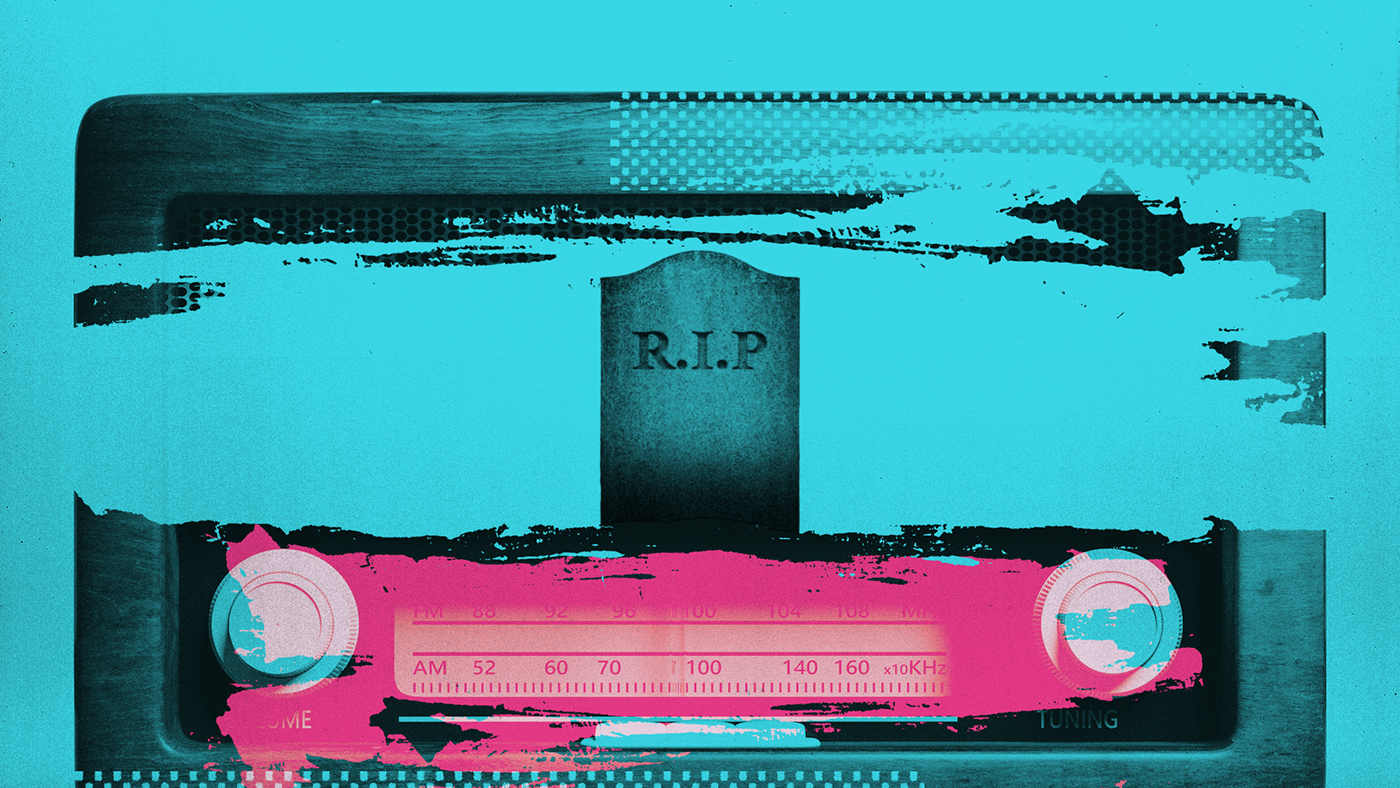The future of AM radio in the US
Automakers that have removed AM radios from new electric vehicles are facing pushback from broadcasters and politicians


A free daily email with the biggest news stories of the day – and the best features from TheWeek.com
You are now subscribed
Your newsletter sign-up was successful
BMW, Mazda and Volkswagen are among the automakers that have decided to stop putting AM radios in new electrical vehicles, citing electric engines interfering with the sound of AM stations. There are 4,185 AM stations in the United States, and owners, hosts and advertisers are concerned that this could be the beginning of the end of the country's AM radio network.
What is AM radio?
"AM" stands for amplitude modulation and was the first method used to transmit broadcast radio signals. When AM radio became widespread in the 1920s, it changed the way Americans received their information and entertainment, with families listening to live baseball and football games, inaugurations, music programs and President Franklin D. Roosevelt's fireside chats.
When did FM radio become more popular than AM radio?
"FM" broadcasting, invented in the early 1930s, uses frequency modulation, offering better sound quality than AM. Although it was clearer than AM, most people didn't make the switch to FM because they only had AM receivers and there wasn't a lot of FM programming. Things shifted in the early 1960s, when FM receivers started becoming less expensive and easier to find, carmakers began to put FM radios in their vehicles, and the Federal Communications Commission opened up more channels for FM stations. In the late 1970s, FM radio eclipsed AM in terms of listenership.
The Week
Escape your echo chamber. Get the facts behind the news, plus analysis from multiple perspectives.

Sign up for The Week's Free Newsletters
From our morning news briefing to a weekly Good News Newsletter, get the best of The Week delivered directly to your inbox.
From our morning news briefing to a weekly Good News Newsletter, get the best of The Week delivered directly to your inbox.
How many Americans listen to AM radio?
AM radio today is known for an abundance of talk radio shows, as well as sports, news, religious and foreign-language programming. About 82 million Americans listen to AM stations every month, according to Nielsen estimates, with AM drawing an older demographic than FM. In rural areas, people tune in to AM radio to hear important announcements, making it "a cornerstone of everyday life for many that also serves a critical life-saving function during extreme weather and natural disasters," National Association of Broadcasters (NAB) President and CEO Curtis LeGeyt said in a statement.
Ben Downs, the owner and general manager of WTAW in Bryan and College Station, Texas, told The Washington Post that "we may not be the first station you turn to, but when the weather's bad, when the game is on, when you need to know what's happening where you live, we're the only place. AM is where news and talk have gone to live. And in the great American Midwest, agricultural radio is on AM. Our audience has gotten older, but when something big happens, everyone in town knows where to turn."
Are there benefits of AM over FM?
Yes. One advantage AM has over FM is that it operates at a lower frequency and has larger wavelengths, which can travel farther and through solid objects. With its wider broadcast range, especially at night, AM radio can be heard by a larger audience, with some listeners tuning in hundreds of miles away from a station.
The answer to the question of whether AM or FM is better varies, Noah Arceneaux, a professor of media studies at San Diego State University, wrote in The San Diego Union-Tribune. "Is the sound quality of the latest pop tune the defining factor?" he asked. "Or are we concerned with the way radio unites geographically distant listeners into a temporary, virtual community of listeners?"
A free daily email with the biggest news stories of the day – and the best features from TheWeek.com
Could AM radio be phased out altogether in the US?
That's not on the table, and AM stations, hosts and radio broadcasters are working together to keep this from becoming an option. NAB has launched a campaign called "Depend on AM Radio," which LeGeyt said elevates "the voices of listeners who depend on AM radio and share opposition to removing the medium with automakers and members of Congress." Stations are running commercials encouraging listeners to contact lawmakers and tell them how important AM radio is in their lives and also pushing new research that shows young people prefer to listen to AM or FM radio in their cars rather than streaming, since it's easier to access while driving.
In regions where FM stations are spotty and there isn't strong Wi-Fi for streaming, AM radio becomes even more critical, Michael Harrison, the publisher of the talk radio trade journal Talkers, told the Post. Doing away with AM radios in cars is "a tone-deaf display of complete ignorance about what AM radio means to Americans," he said. "It's not the end of the world for radio, but it is the loss of an iconic piece of American culture."
Are lawmakers listening?
Sen. Ed Markey (D-Mass.) wrote a letter in late 2022 to 20 automakers, asking them to keep AM radios in new cars in order to ensure public safety information can be easily broadcasted. "Although the auto industry's investments in electric vehicles are critical to addressing the climate crisis and reducing greenhouse gas emissions, automakers need not sacrifice the benefits of radio in the process," he said. Honda, Hyundai, Jaguar/Land Rover, Kia, Lucid, Mitsubishi, Nissan, Stellantis, Subaru and Toyota responded and said they do not plan on removing AM radios from their vehicles.
To the automakers who said they have removed AM radio from their electric vehicles, Markey dismissed their reasoning that the public can use other communication tools during an emergency, like streaming radio. People might not have internet access in their cars, Markey said, and "the truth is that broadcast AM radio is irreplaceable."
Rep. Josh Gottheimer (D-N.J.) sent automakers his own letter in March, requesting those that have eliminated AM radios to reconsider. He also called for more federal dollars to go to beefing up AM radio infrastructure and asked the National Highway Traffic Safety Administration to add AM radio to the Federal Motor Vehicle Safety Standards, making AM radio a stock feature in automobiles. "The importance of AM radio during large-scale emergencies cannot be underestimated, and it has, without a doubt and without interruption, saved lives and kept our communities informed," Gottheimer said. "When the cellphone runs out, the internet gets cut off or the television doesn't work because of no electricity or power to your house, you can still turn on your AM radio."
Have any automakers changed course on AM radio?
Yes. Ford had planned on taking AM radio out of all of its automobiles, but on May 23, CEO Jim Farley shared on social media that the company is shifting gears. "We've decided to include it on all 2024 Ford and Lincoln vehicles," he said. "For any owners of Ford's EVs without AM broadcast capability, we'll offer a software update" to restore it.
Ford spokesman Alan Hall said AM will be offered in future vehicles as the company continues to look for new ways to make sure drivers are aware of emergency alerts. In a statement, Markey said Ford's reversal "reflects an overdue realization about the importance of AM radio, but too many automakers are still going the wrong direction."
Updated May 29, 2023: This article has been updated throughout.
Catherine Garcia has worked as a senior writer at The Week since 2014. Her writing and reporting have appeared in Entertainment Weekly, The New York Times, Wirecutter, NBC News and "The Book of Jezebel," among others. She's a graduate of the University of Redlands and the Columbia University Graduate School of Journalism.
-
 What is the endgame in the DHS shutdown?
What is the endgame in the DHS shutdown?Today’s Big Question Democrats want to rein in ICE’s immigration crackdown
-
 ‘Poor time management isn’t just an inconvenience’
‘Poor time management isn’t just an inconvenience’Instant Opinion Opinion, comment and editorials of the day
-
 Bad Bunny’s Super Bowl: A win for unity
Bad Bunny’s Super Bowl: A win for unityFeature The global superstar's halftime show was a celebration for everyone to enjoy
-
 Is the 'vibecession' over?
Is the 'vibecession' over?Speed Read The IMF reported that the global economy is looking increasingly resilient. Is it time to start celebrating?
-
 The U.S. veterinarian shortage crisis
The U.S. veterinarian shortage crisisSpeed Read With an anticipated shortage of 15,000 vets by 2030, it will be harder to get care for pets
-
 Inside Russia's war crimes
Inside Russia's war crimesSpeed Read Occupying forces in Ukraine are accused of horrific atrocities. Can they be held accountable?
-
 Is it safe to ride a roller coaster?
Is it safe to ride a roller coaster?The Explainer A pair of startling events have shined a light on amusement park safety
-
 World leaders who have been charged or imprisoned
World leaders who have been charged or imprisonedThe Explainer Heads of state being put behind bars is not a rare occurrence
-
 The China-Cuba connection, explained
The China-Cuba connection, explainedSpeed Read Reports of an eavesdropping deal roil Washington
-
 The persistent inequities of Covid-related learning loss
The persistent inequities of Covid-related learning lossSpeed Read The pandemic set a generation of students back in their education. Can they catch up?
-
 How conservatives have moved to undermine federal authority
How conservatives have moved to undermine federal authorityThe Explainer What has the GOP done to try and make government smaller?
